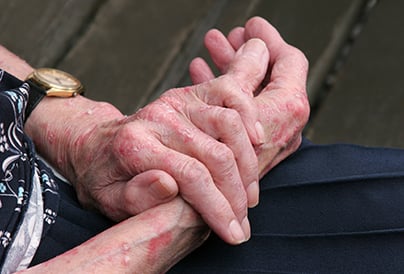Shingles is a painful rash caused by the herpes zoster virus, which is the reactivated chickenpox virus, and typically occurs in older adults with weak immune systems.

Shingles occurs in those who have been infected previously with the chickenpox virus. It is estimated that about 1 million cases of shingles occurs in the U.S. each year.1 Shingles usually occurs only once in a lifetime, but it is possible to get shingles two or even three times in a lifetime. Shingles can be identified by the following characteristics:
Once the shingles rash is present, it is very difficult to treat it with medication, but if caught early enough, anti-viral medications may help. Preventing shingles is the primary strategy due to these limitations in treating it when it is active. The most common risk factor related to getting shingles is related to a decreased functioning immune system. Any strategy that helps maintain a more consistently well-functioning immune system will be able to lower the risk of shingles. A Nutritarian eating style is designed to provide the maximum number and amount of immune system-boosting nutrients. All the factors that promote longevity reduce risk of shingles, including regular exercise, emotional health, adequate sleep, and superior nutrition.
The shingles vaccine is another option, and the Advisory Committee of Immunization Practices (ACIP) recommends one dose for adults older than 60. Poor compliance with this recommendation has been noted possibly due to the expense of the vaccine or the fact that the vaccines efficacy is worse in the elderly and diminishes with aging. As the results wear off in time, studies are ongoing to assess the duration and degree of protection from one dose. The vaccine is not indicated for treating shingles once it occurs.
A Nutritarian eating style includes an abundance of immune-system boosting foods such as:
Blending or juicing these foods (primarily the green leafy vegetables) on a regular basis helps to further boost the absorption of important nutrients needed to help fight infection, especially with aging.
Zinc is an important nutrient involved in the immune system, and taking supplemental zinc (around 10-30 mg daily) may be helpful with aging to reassure adequacy.
Of course, declining Vitamin D levels and insufficiency common in the elderly contributes to weakened immunity and should be addressed and prevented.
Many forms of stress can weaken the immune system, including psychological stress, poor sleep, and other forms of physical stress. Make sure to implement healthy sleeping habits and stress-reduction strategies such as moderate exercise and meditation.
ONLINE: All members of DrFuhrman.com can search the Ask the Doctor archives for discussions on this topic. Platinum and Diamond members can connect with Dr. Fuhrman by posting questions in the forum. Not a member? Join now.
IN PERSON or ONLINE: Book a consultation with a specialist at Longevity Rx in San Diego, California, run by Joel Fuhrman, MD and Cara Fuhrman, ND. Using nutritional protocols, cutting-edge screening tools, advanced imaging, and innovative treatments for pain and injuries, they'll create a personalized action plan to help you prevent and recover from illness, and achieve your optimal weight. Book online at Longevity Rx or call +1 (858) 367-3558
EVENTS: Join Dr. Fuhrman for an online boot camp, detox or other event. During these immersive online events, you’ll attend zoom lectures, follow a special meal plan, and have access to a special, live Q&A session with Dr. Fuhrman. Learn more about events.
The following are sample questions from the Ask the Doctor Community Platinum and higher members can post their health questions directly to Dr. Fuhrman. (All members can browse questions and answers.)
My husband has had shingles for four weeks. The blisters have almost healed, but the nerve pain has kicked in. He has avoided pain pills other than a few doses of Tylenol, but his doctor just prescribed Gabapentin, and he is debating whether he should try it. Can you recommend a protocol for him? His doctor told him to stop taking his supplements, and they have had him on antibiotics and now high doses of antiviral for four weeks. I do have him taking a good probiotic, but he usually takes two of your men’s vitamins and also fish oil.
It depends on if he can sleep comfortably without pain meds. If the pain is keeping him awake at night, I would agree with his physician. Long term use of Tylenol is risky, and it also wears off in 4–6 hours.
I doubt he should be on antibiotics either, since this is a viral issue, and the risk of a bacterial infection from the blisters is low and has passed. You should question the doctor on this. Plus, at this point ,anti-virals are of no benefit either.
He should follow my regular recommendations for super immunity, and take my Men’s Formula and DHA-EPA Purity, not fish oil. Fish oil can give too much of the immune-suppressing EPA. He should also take one Immunotect with each meal. Lastly, he should take an extra 30 mg. of zinc for a few weeks.